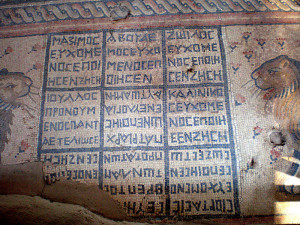Lawrence H. Schiffman, From Text to Tradition, Ktav Publishing House, Hoboken, NJ, 1991.
 Only a few Jews in the Hellenistic Diaspora went so far as to apostasize from Judaism. A somewhat larger group seems to have become involved in syncretism, identifying the God of Israel with the chief pagan deity, a phenomenon which had grievous consequences in Judea. Some scholars have mistakenly considered the religion of the syncretists to have been the dominant Judaism of the Diaspora, but in fact this approach had few adherents, and for the most part, the Diaspora Jews were loyal to their ancestral ways and faith. At the same time, however, they eagerly sought to adapt and accommodate to the surroundings in which they lived, especially when they came to have the same educational background and occupations as their neighbors, a process that was abetted by the many shared ethical concepts of Judaism and the Greek philosophical tradition.
Only a few Jews in the Hellenistic Diaspora went so far as to apostasize from Judaism. A somewhat larger group seems to have become involved in syncretism, identifying the God of Israel with the chief pagan deity, a phenomenon which had grievous consequences in Judea. Some scholars have mistakenly considered the religion of the syncretists to have been the dominant Judaism of the Diaspora, but in fact this approach had few adherents, and for the most part, the Diaspora Jews were loyal to their ancestral ways and faith. At the same time, however, they eagerly sought to adapt and accommodate to the surroundings in which they lived, especially when they came to have the same educational background and occupations as their neighbors, a process that was abetted by the many shared ethical concepts of Judaism and the Greek philosophical tradition.
The writings of numerous Greek and Latin authors testify that the Jews of the Greco- Roman world observed such central commandments as the Sabbath, the laws regarding forbidden foods, and circumcision. The influence of the synagogues on many Greco- Roman pagans leads us to believe that they were well attended. Here Jews gathered to worship and to hear homilies which taught them how to synthesize Judaism with the prevailing culture. Synagogues were found throughout the Diaspora, often more than one in a community. Some were magnificent structures which were part of the complex of public buildings of their respective cities.
We cannot be certain of the language of prayer in Hellenistic synagogues. In all probability, at least the greatest part of the worship service was conducted inkoine Greek, the dialect of the Hellenistic world. Evidence points to the use of psalms as part of the service, clearly in imitation of the Temple ritual. As for the reading of the Torah, it is virtually certain that Greek Bible texts, of which the Septuagint is an example, were in use. It is not known for sure, though, whether the formal Torah reading was conducted in Greek or took place from the Hebrew text with the Greek, much like the later Aramaic targums, serving as a translation. Tombstones indicate that Diaspora Jews had at least some knowledge of Hebrew. Moreover, a process of Hebraization can be observed in the later Roman and Byzantine periods as Hellenistic Judaism was pulled in two contradictory directions, toward Palestinian tannaitic Judaism on the one hand, and toward assimilation to the Christianized Roman world on the other.
Jews in the Greco-Roman world celebrated the Sabbath, as well as the annual cycle of festivals and new moons, just as did their brethren in Palestine. They gathered for festive communal meals and erected booths for the festival of Sukkot. Some communities observed local commemorative days as well. Strong ties to the Land of Israel were maintained. In the years before the destruction of the Temple, Jews from great distances streamed to the holy city for the pilgrimage festivals. Various Temple furnishings were donated by Diaspora Jews. Regular Temple taxes were collected throughout the Diaspora and sent to Palestine. After the destruction of the Temple, Diaspora communities continued to support the patriarchate in Palestine.
Nevertheless, some scholars have argued that an attenuation of ritual observance did occur in the Hellenistic world. A more serious threat to traditional Judaism came from philosophically oriented Jews who explained the Torah as an allegory and therefore maintained that the commandments did not have to be observed. Philo Judaeus, the Alexandrian, forcefully objected to this approach.
All in all, the Judaism of the Greco-Roman Diaspora set patterns of communal organization that would carry Jews through the next two thousand years. The collapse of Hellenistic culture and the rise of Christianity ultimately led to its decline. Yet in its heyday Hellenistic Judaism was vibrant and committed; its strength is best demonstrated by the many semi-proselytes who flocked to its institutions and by the rich literature it left.